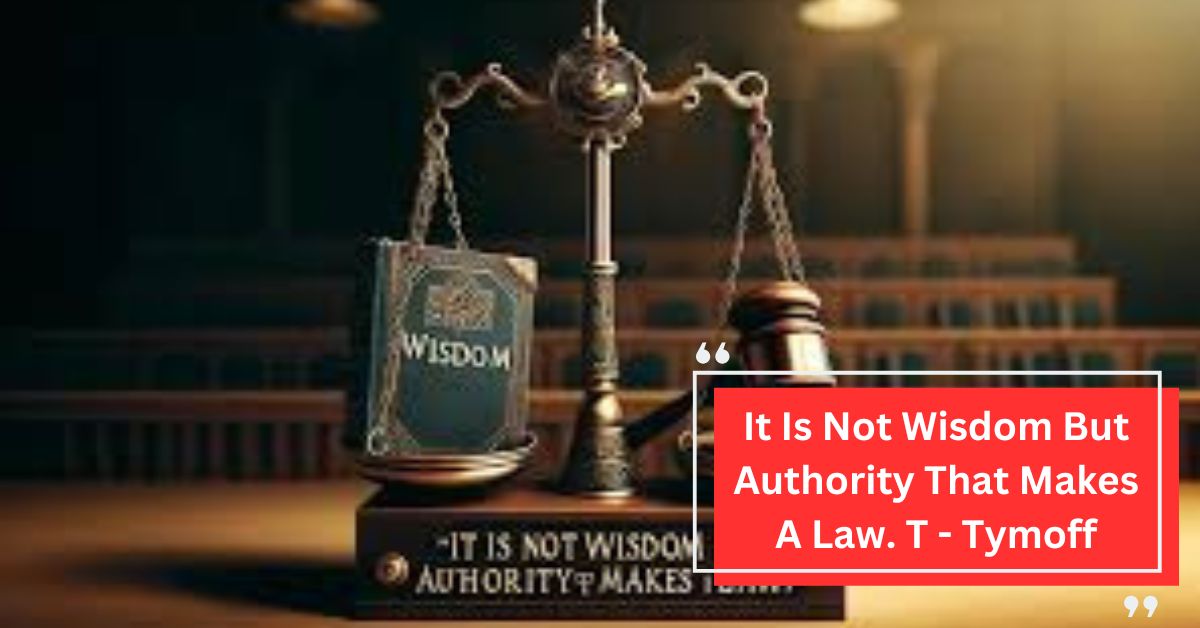It Is Not Wisdom But Authority That Makes A Law. T – Tymoff – Join Discussion!
In my personal experience, encountering the phrase it is not wisdom but authority that makes a law. t – tymoff has highlighted the stark reality of how power dynamics can shape legal decisions.
it is not wisdom but authority that makes a law. t – tymoff suggests that legal decisions often prioritize power over fairness or ethics, highlighting the need for balanced governance to ensure just laws.
Let’s explore the thought-provoking idea that it is not wisdom but authority that makes a law. t – tymoff with us.
What Does ” It Is Not Wisdom But Authority That Makes A Law. T – Tymoff Mean – Read Now It!
The phrase it is not wisdom but authority that makes a law. t – tymoff means that laws are often made by those in power rather than through thoughtful and fair consideration. It suggests that authority, or the power to enforce rules, is what creates laws, not necessarily wisdom or the best judgment.
In simpler terms, it is not wisdom but authority that makes a law. t – tymoff
the quote points out that the people who have the power to make and enforce laws are the ones who shape them, regardless of whether those laws are wise or beneficial for society.
It highlights a potential problem where laws may not always be made with the common good in mind but instead could be influenced by the whims and interests of those in power.
When was the phrase “it is not wisdom but authority that makes a law. t – tymoff” first used – Start Exploring!
The phrase it is not wisdom but authority that makes a law. t – tymoff is often linked to the ideas of T. Tymoff, but it reflects a concept that has been discussed for a long time. Similar thoughts have been expressed by philosophers and thinkers throughout history.

In more recent times, it is not wisdom but authority that makes a law. t – tymoff phrasing has brought this age-old concept back into modern discussions about law and governance. The phrase highlights the ongoing debate about whether laws should be based more on authority or wisdom.
Why is wisdom important in making law? – Guide One By One!
- Fairness and Justice: Wisdom ensures that laws are fair and just, protecting the rights and interests of all individuals in society.
- Ethical Considerations: Wise law-making incorporates ethical principles, ensuring that laws align with moral values and societal norms.
- Long-Term Consequences: Wisdom allows lawmakers to foresee the long-term impact of laws, preventing unintended negative consequences and ensuring sustainable outcomes.
- Public Trust: Laws made with wisdom earn public trust and respect, leading to better compliance and cooperation from the community.
- Adaptability: Wisdom helps in crafting laws that are flexible and adaptable to changing circumstances, making them relevant over time.
- Conflict Resolution: Wise laws facilitate peaceful resolution of conflicts by being balanced and considerate of different viewpoints.
- Inclusiveness: Wisdom ensures that the voices and needs of all segments of society, including minorities and vulnerable groups, are considered in the law-making process.
- Stability: Laws based on wisdom contribute to social stability and order by addressing root causes of issues rather than just symptoms.
- Innovation: Wisdom encourages innovative solutions to complex problems, promoting progress and development in society.
- Global Standards: Wise laws can align with international standards and practices, fostering better cooperation and understanding between nations.
Also Read: Nftrandomize – Revolutionizing Digital Assets With Randomization!
How Can Authority Affect The Creation Of Laws? – You Need To Know!
it is not wisdom but authority that makes a law. t – tymoff Authority plays a big role in making laws because the people or groups with power have the ability to decide what rules everyone has to follow. When those in power create laws, they can shape them based on their own interests or perspectives.
However, it is not wisdom but authority that makes a law. t – tymoff relying too much on authority without including wisdom can lead to problems. Laws made only by those in power might ignore the needs and rights of ordinary people, leading to unfair or oppressive rules.
How does this idea impact society ?– Detail Of it is not wisdom but authority that makes a law. t – tymoff!
The idea that authority, rather than wisdom, often makes laws can have a big impact on society. When laws are created mainly by those in power without considering fairness or the well-being of everyone, it can lead to feelings of injustice among the public.

Moreover, if laws are seen as unfair or oppressive, it can create social unrest and conflict. People might protest or rebel against what they perceive as unjust rules, which can disrupt the harmony and stability of society.
Can Laws Shift Towards Being More Wisdom?-Driven Than Authority-Driven?
Yes, laws can become more wisdom-driven instead of being purely authority-driven. This shift can happen when governments and lawmakers start to involve experts, citizens, and ethical considerations in the process of making laws.
Additionally, it is not wisdom but authority that makes a law. t – tymoff increasing transparency and public participation in the law-making process can help shift laws toward being more wisdom-driven.
When people have a say in creating laws and can see how decisions are made, it promotes a sense of ownership and trust in the legal system.
Also Read: Andre Hakkak Net Worth – A Good Person In Finance!
What Happens When Authority Overrides Wisdom In Making Laws? – Click Here!
When authority overrides it is not wisdom but authority that makes a law. t – tymoff wisdom in making laws, it can lead to unfair and unjust rules.
Laws created mainly by those in power, without considering fairness or expert advice, might serve the interests of a few rather than the whole society. This can result in rules that do not protect the rights of all people and may even harm certain groups.
This imbalance can also cause people to lose trust in their government and legal system. If citizens feel that laws are not made with their best interests in mind, they might become frustrated and disillusioned. This can lead to protests, social unrest, and a general lack of respect for the law.
FAQs:
How can citizens influence the creation of laws?
Citizens can influence the creation of laws by participating in public consultations, voting, engaging with their representatives, and being active in advocacy and lobbying efforts.
How does transparency in the law-making process contribute to wisdom-driven laws?
Transparency allows the public to see how laws are made, who is involved, and what considerations are taken into account. This openness helps ensure that laws are made in the public interest and reduces the likelihood of laws being driven solely by the interests of those in power.
What are the potential consequences of laws that lack wisdom?
Laws that lack wisdom can lead to social injustice, public dissatisfaction, and a lack of respect for the legal system. They can also result in negative long-term consequences, such as economic instability, environmental damage, and increased social conflict.
Can unjust laws be changed to become more wisdom-driven?
Yes, unjust laws can be reformed through the efforts of lawmakers, public advocacy, and legal challenges. Over time, as societies evolve and public awareness grows, there is potential to revise and improve laws to make them more fair and just.
Conclusion:
The phrase it is not wisdom but authority that makes a law. t – tymoff highlights the significant influence of power in the creation of laws, often overshadowing the importance of fairness and ethical considerations.
While authority provides the framework for establishing and enforcing laws, wisdom ensures that these laws are just, equitable, and beneficial for society.
Read More:







